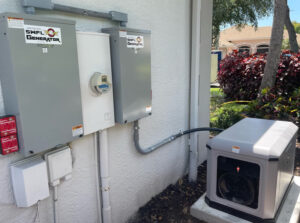When Is It Time to Replace Your Whole House Generator?

1. Frequent Breakdowns and Repairs
One of the most obvious signs that your generator is nearing the end of its life is frequent breakdowns. If you find yourself calling for repairs more often than usual, it might be more cost-effective to replace the unit. Constant repairs not only add up in cost but also indicate that the generator is no longer reliable. A new generator can save you from the inconvenience and expense of repeated repairs.
2. Difficulty Starting
A generator that struggles to start or takes longer than usual to power up is a red flag. This issue can be due to several factors, including wear and tear on the engine or problems with the fuel system. If your generator hesitates to start during a power outage, it defeats its primary purpose. In such cases, replacing the generator ensures you have a reliable power source when you need it most.
3. Excessive Fuel Consumption
Older generators tend to consume more fuel to produce the same amount of power. If you notice a significant increase in fuel usage, it might be time to upgrade. Modern generators are designed to be more fuel-efficient, which can save you money in the long run. Plus, excessive fuel consumption is often a sign that the generator’s internal components are wearing out.
4. Age of the Generator
The lifespan of a whole house generator typically ranges from 10 to 15 years, depending on usage and maintenance1. If your generator is approaching or has surpassed this age range, it’s wise to start considering a replacement. Even with regular maintenance, older generators are more prone to failures and may not meet current efficiency standards.
5. Inconsistent Power Supply
A generator that provides inconsistent power or fluctuates in performance is a cause for concern. This inconsistency can damage your home appliances and electronics. If your generator can no longer provide a stable power supply, it’s time to invest in a new one. Modern generators offer advanced technology that ensures a consistent and reliable power output.
6. Outdated Technology
Technology in the generator industry has advanced significantly over the years. If your generator is outdated, you might be missing out on features that enhance efficiency, safety, and convenience. Newer models come with improved fuel efficiency, quieter operation, and advanced monitoring systems. Upgrading to a modern generator can provide better performance and peace of mind.
7. Increased Power Needs
As your household grows or you add more electrical appliances, your power needs may increase. If your current generator can no longer meet your power requirements, it’s time to consider a replacement. A generator that is too small for your needs will struggle to keep up, leading to potential overloads and failures.
Conclusion
Replacing your whole house generator is a significant decision, but it’s essential for ensuring your home remains powered during outages. If you’re experiencing any of the issues mentioned above, it might be time to consult with a professional about a replacement. At SWFL Generator, we specialize in the sales, installation, maintenance, and repair of whole house generators in Southwest Florida. Our team of certified technicians is here to help you choose the right generator for your needs and ensure a seamless installation process.
For more information or to schedule a consultation, visit SWFL Generator or call us at (239) 222-1672. Don’t wait until your generator fails during a critical moment—ensure your home’s power security today with SWFL Generator.
Feel free to reach out if you have any questions or need further assistance!

